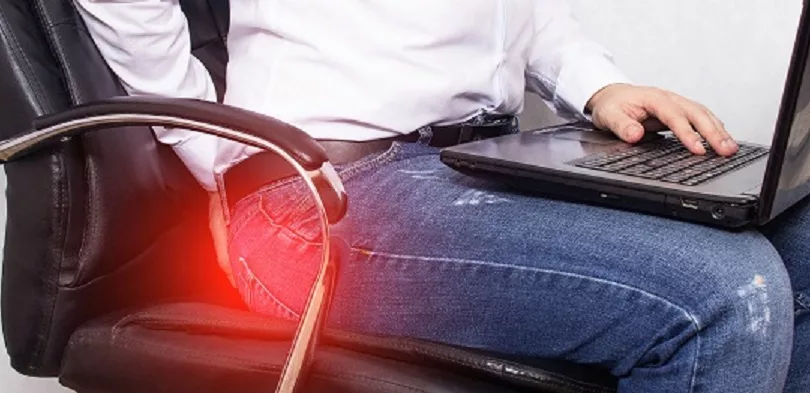Dealing with the discomfort of hemorrhoids can be frustrating, especially when they cause pain, swelling, and irritation. Finding relief becomes a priority, and many wonder if ice packs can be a simple solution. Hemorrhoids, which are swollen blood vessels in the rectal area, often lead to intense itching and sharp pain, particularly during bowel movements.
One proven fact is that cold therapy is known to reduce inflammation and numb the area, which raises the question: can ice packs offer relief for hemorrhoid sufferers?
In this discussion, we’ll explore whether ice packs are an effective treatment for hemorrhoids, when to use them, and what you need to know before trying this approach. Let’s dive into the details and find out if this home remedy can bring the relief you’re seeking.
What Are Hemorrhoids?
Hemorrhoids are swollen blood vessels in the rectal and anal area. There are two types: internal hemorrhoids, which develop inside the rectum—and external hemorrhoids, which develop under the skin around the anus.
Hemorrhoids can be caused by various factors, including straining during bowel movements, chronic constipation or diarrhea, obesity, pregnancy, and a sedentary lifestyle. The most common symptoms of hemorrhoids include pain, itching, bleeding during bowel movements, and discomfort.
How Do Ice Packs Help in Treating Hemorrhoids?
Ice packs, when appropriately used, can be an effective way to alleviate the symptoms of hemorrhoids.
- Reduces Swelling: Hemorrhoids are often associated with inflammation and swelling. Applying an ice pack to the affected area can help constrict blood vessels, reducing blood flow to the swollen tissue to help it go down and provide relief.
- Numbing Effect: Ice packs can also numb the area to alleviate pain and discomfort. The cold temperature temporarily reduces the pain sensation, making it easier to tolerate the symptoms.
- Relieves Itching: Hemorrhoids can be extremely itchy. Applying an ice pack can help soothe the itchiness.
How to Use Ice Packs for Hemorrhoids
When using ice packs for hemorrhoid relief, it’s important to do so safely and effectively. Here are some steps to follow.
- Select the Right Type of Ice Pack: You can use a commercial ice pack or create your own by placing ice cubes or crushed ice in a clean, thin cloth or a plastic bag.
- Use a Barrier: To avoid direct skin contact with the ice, wrap it in a clean, soft cloth or a thin barrier, like a paper towel or plastic wrap.
- Apply in Short Intervals: Apply the ice pack to the affected area for 15 to 20 minutes. You can repeat this several times a day. Avoid prolonged use, as excessive cold can cause skin damage or worsen the condition.
- Maintain Proper Hygiene: Ensure the ice pack is clean and contaminant-free to prevent infection. If using a homemade ice pack, store it in a separate, clean plastic bag.
- Consult a Healthcare Professional: If you have severe hemorrhoids or your symptoms do not improve, you should always consult a healthcare professional for a proper evaluation and potential additional treatment options.
Limitations of Ice Packs in Hemorrhoid Treatment
While ice packs can relieve hemorrhoid symptoms, there are limitations to this method.
- Temporary Relief: Ice packs temporarily relieve pain, swelling, and itching. They do not address the underlying cause of hemorrhoids.
- Not a Cure: Ice packs are a symptomatic treatment and do not cure hemorrhoids. To effectively treat hemorrhoids, it’s necessary to address the root causes.
- May Not be Suitable for Everyone: Some individuals may find ice packs uncomfortable or may have conditions that make them unsuitable, such as cold intolerance. In such cases, alternative treatments should be considered.
- Not a Substitute for Medical Advice: If you experience severe or recurrent hemorrhoids or notice rectal bleeding, it’s crucial to seek medical advice. Hemorrhoids can sometimes be a sign of more severe conditions, such as colorectal cancer, and a healthcare professional can provide a proper diagnosis and treatment plan.
Other Hemorrhoid Treatment Options
In addition to using ice packs, several other treatment options are available for hemorrhoids, depending on the severity of the condition. These include:
- Topical Creams and Ointments: Over-the-counter or prescription creams and ointments for Hemorrhoids can relieve itching and discomfort. Some of these contain corticosteroids to reduce inflammation.
- Fiber Supplements: Increasing dietary fiber intake or fiber supplements can help soften stool, making bowel movements less painful and reducing the risk of further irritation.
- Sitz Baths: Soaking in a warm bath (known as a sitz bath) can help soothe the affected area and relieve pain and discomfort. Some people use Epsom salt in the bathwater for added relief.
- Lifestyle and Dietary Changes: Adjusting your diet and lifestyle can help prevent and manage hemorrhoids. This includes staying hydrated, avoiding straining during bowel movements, and maintaining a balanced fiber-rich diet.
- Hemorrhoid Procedures: Medical procedures may be necessary for severe hemorrhoids that don’t respond to conservative treatments. These can include rubber band ligation, sclerotherapy, or surgical removal of the hemorrhoids.
- Medications: In some cases, a healthcare provider may prescribe medications to treat hemorrhoids, especially if they are causing severe discomfort or bleeding.
When to Seek Medical Attention
It’s essential to know when to seek medical attention for hemorrhoids. Consult a healthcare professional if you experience any of the following:
- Severe pain or bleeding during bowel movements.
- Symptoms that don’t improve with at-home treatments.
- Recurrent or persistent hemorrhoids.
- A lump near your anus or rectal bleeding, which could be signs of more severe conditions requiring evaluation.
Conclusion
In conclusion, ice packs can be a helpful and accessible option for managing the symptoms of hemorrhoids. They provide relief from pain, swelling, and itching and are a non-invasive approach to treatment.
However, it’s crucial to remember that they are temporary and do not address the underlying causes of hemorrhoids. For long-term relief and management, it is advisable to make lifestyle and dietary changes, consider other treatment options, and, if necessary, consult a healthcare professional for a more comprehensive approach to managing hemorrhoids. Hemorrhoids can be a recurring condition for some individuals, so understanding how to manage and treat them effectively is essential for maintaining comfort and quality of life.
FAQs
How Do Ice Packs Reduce Swelling and Pain?
Ice packs work by constricting blood vessels, reducing blood flow to the affected area. This helps minimize inflammation and swelling. The cold temperature also numbs the skin, offering pain relief. Together, these effects make ice packs a simple, effective option for managing hemorrhoid discomfort.
Can Ice Packs Completely Cure Hemorrhoids?
Ice packs cannot fully cure hemorrhoids. They provide temporary relief from swelling, pain, and inflammation but don’t address the underlying causes. Lasting solutions involve dietary changes, better hydration, and avoiding strain during bowel movements. In severe cases, medical treatment may be required for proper resolution.
How Long Should I Use an Ice Pack on Hemorrhoids?
Apply an ice pack for 5 to 15 minutes at a time. Repeat this several times a day, but ensure breaks between uses to prevent frostbite or skin damage. Always wrap the ice pack in a cloth or towel to avoid direct contact with the skin.
How Do Warm Compresses Compare to Ice Packs in the Treatment of Hemorrhoids?
Warm compresses increase blood flow, promoting healing and muscle relaxation, while ice packs reduce swelling and numb pain. Alternating between cold and warm treatments can help manage symptoms more effectively, providing both immediate relief and supporting longer-term recovery.







